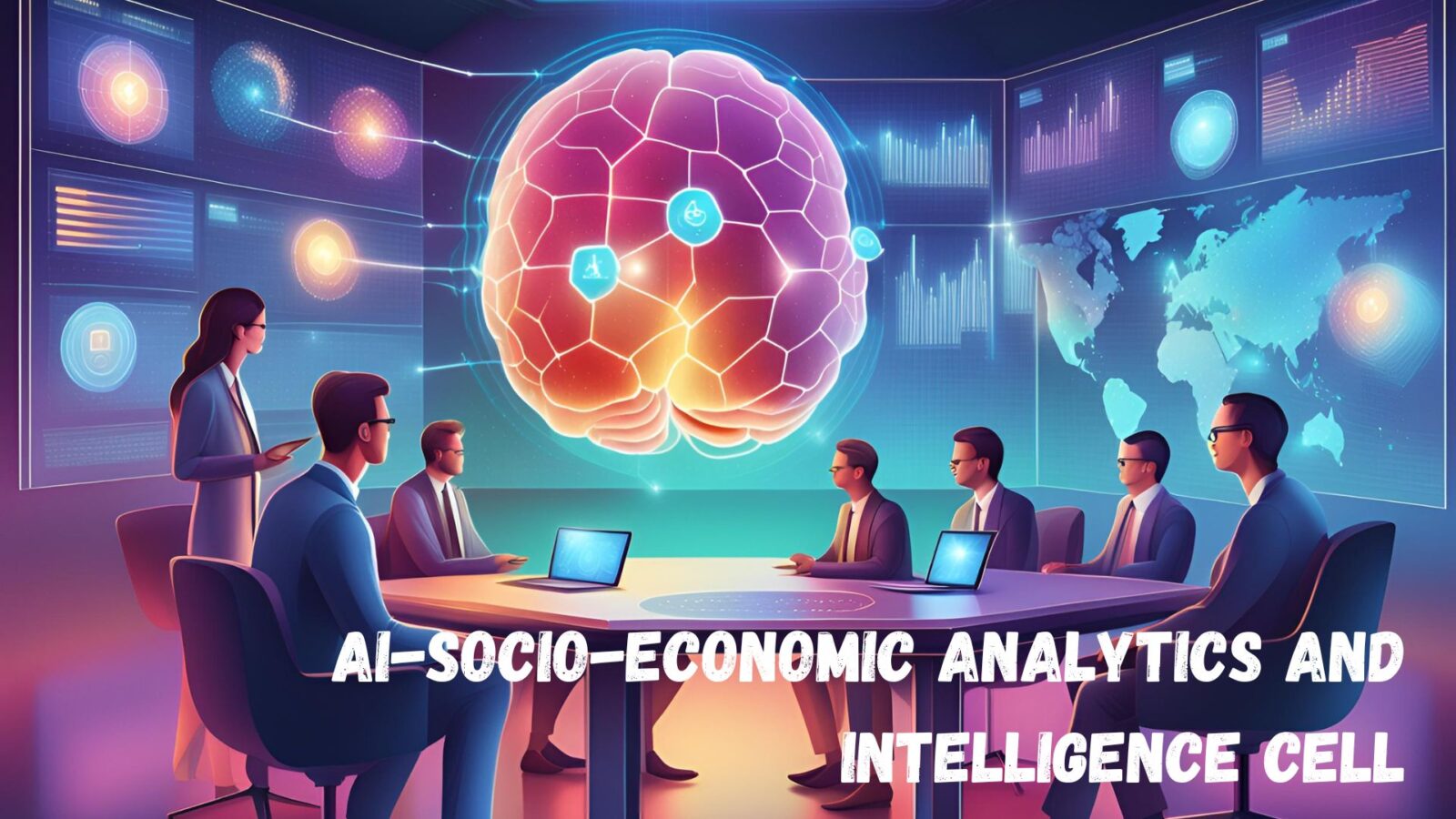AI SOCIO ECONOMIC ANALYTICS AND INTELLIGENCECELL

Mission
The mission of the AI-SOCIO-ECONOMIC Analytics and Intelligence Cell is to harness the power of artificial intelligence and data analytics to provide in-depth insights into socioeconomic trends, enabling evidence-based decision-making for the betterment of society. We aim to uncover hidden patterns, predict future scenarios, and drive positive socioeconomic transformations.
Vision
Our vision is to create a data-driven world where AI-driven insights empower policymakers, businesses, and communities to address complex socio-economic challenges, foster equitable growth, and enhance overall well-being.
Goals
- Data-Driven Insights: Leverage AI and data analytics to generate comprehensive insights into socio-economic dynamics, guiding informed strategies.
- Empower Decision-Makers: Equip policymakers, businesses, and organizations with actionable intelligence to foster sustainable development.
- Predictive Modeling: Develop predictive models to anticipate socio-economic trends and outcomes, enabling proactive interventions.
- Inclusive Development: Prioritize inclusivity and equity in socio-economic analysis to ensure benefits reach all segments of society.
- Evidence-Based Policies: Support the formulation of evidence-based policies that address socio-economic disparities and challenges effectively.
- Stakeholder Collaboration: Foster collaboration among academia, governments, industries, and communities for holistic insights.
- Ethical AI Use: Uphold ethical AI practices, ensuring privacy, fairness, and transparency in socio-economic analysis.
- Education and Awareness: Raise awareness about the power of AI in socioeconomic analysis and promote data literacy.
Program Details
The AI-SOCIO-ECONOMIC Analytics and Intelligence Cell offers the following services:
- Socio-Economic Trend Analysis: Utilize AI to analyze socio-economic trends, identifying key drivers and potential impact on various sectors.
- Predictive Modeling: Develop models that forecast economic indicators, social behaviors, and market trends for informed planning.
- Policy Impact Assessment: Assess the potential impact of policies on socio-economic indicators to guide effective decision-making.
- Community Profiling: Use data analytics to profile communities, understanding their socio-economic needs and tailoring interventions.
- Economic Resilience Analysis: Analyze economic resilience to external shocks, guiding strategies for sustainable development.
- Inclusive Growth Analysis: Evaluate the inclusivity of economic growth and recommend measures for equitable distribution.
- Industry Analysis: Study the socio-economic impact of industries, highlighting areas for growth and challenges to address.
- Resource Allocation Optimization: Optimize resource allocation to maximize socio-economic impact, minimizing wastage.
- Foresight Reports: Generate reports that provide foresight into potential socio-economic scenarios, aiding long-term planning.
Future
The AI-SOCIO-ECONOMIC Analytics and Intelligence Cell envisions a future where:
- Global Socio-Economic Insights: Collaborations with international partners provide a broader perspective on global socio-economic trends.
- Socio-Economic Heatmaps: Real-time heatmaps visualize localized socio-economic challenges, enabling precise interventions.
- Policy Simulations: AI-driven simulations predict the outcomes of various policy scenarios, helping policymakers make informed choices.
- Real-time Dashboards: Real-time dashboards offer live insights into changing socio-economic indicators, empowering immediate responses.
- Personalized Socio-Economic Guidance: AI-powered tools offer individuals customized advice on financial planning and resource management.
- Socio-Economic Equity Index: Introducing an index that measures the equity of socio-economic development across different demographic groups.
- Ethical AI Charter: Champion ethical AI practices through partnerships, ensuring socio-economic insights are unbiased and fair.
- Socio-Economic Innovation Labs: Establish innovation labs that use AI to drive novel solutions for pressing socio-economic challenges.
- Data for Development Hub: Building a hub that provides open data for researchers, policymakers, and businesses to drive socio-economic progress.
- AI-Driven Public Services: Collaborating with governments to implement AI in public services, optimizing resource allocation for maximum impact.
- Socio-Economic Education: Creating educational programs that empower individuals and organizations with AI-driven socio-economic insights.
- Cross-Disciplinary Synergy: Partnering with diverse fields like healthcare, education, and urban planning to explore holistic socio-economic impact.
- Sustainable Development Benchmarks: Setting benchmarks for sustainable socio-economic development, guiding countries toward a better future.
- AI for Societal Well-being: Promoting the use of AI in fostering overall societal well-being through socio-economic advancements.
Join us at the AI-SOCIO-ECONOMIC Analytics and Intelligence Cell as we harness the power of AI to drive positive socio-economic transformations, shaping a more prosperous and equitable future for all.